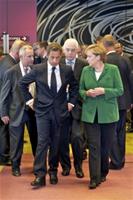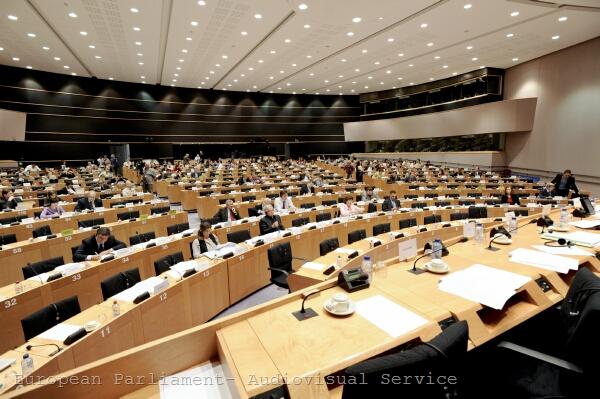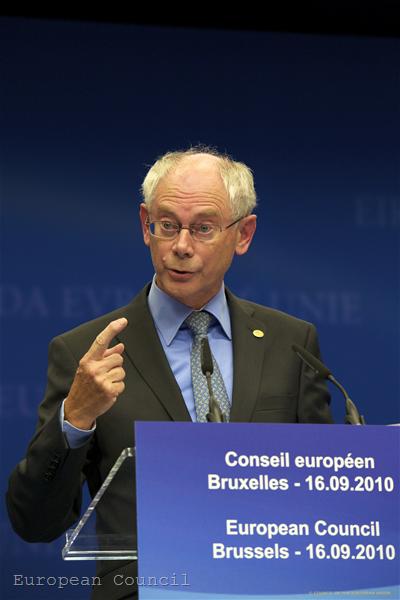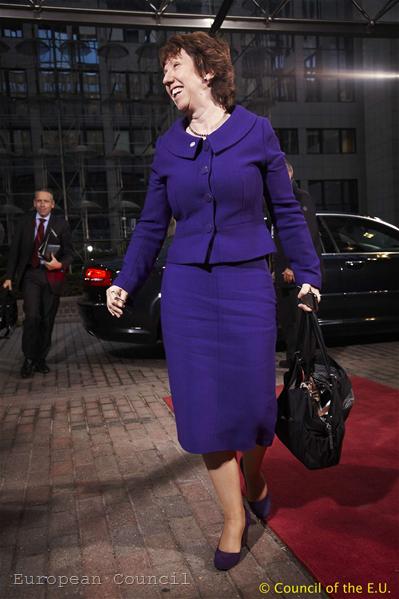Changes in the Lisbon treaty? May be, but unlikely
Ralitsa Kovacheva, September 19, 2010
 A change in the Lisbon Treaty, after all, is not excluded in relation to the imposition of sanctions on countries violating the Stability and Growth Pact, as it became clear from the words of EU President Herman Van Rompuy after the European Council on Foreign Policy. Asked whether the task force, chaired by him, would be able to complete its work by the Council in October, Van Rompuy confirmed that the final report would be ready for certain, as far as they were working within the framework of the current treaties.
A change in the Lisbon Treaty, after all, is not excluded in relation to the imposition of sanctions on countries violating the Stability and Growth Pact, as it became clear from the words of EU President Herman Van Rompuy after the European Council on Foreign Policy. Asked whether the task force, chaired by him, would be able to complete its work by the Council in October, Van Rompuy confirmed that the final report would be ready for certain, as far as they were working within the framework of the current treaties.
"If we agree on treaty changes then the work has to be done further after  October. But that is still to be decided by the European Council, but it is a real possibility that we work further after October on what goes beyond the current treaties."
October. But that is still to be decided by the European Council, but it is a real possibility that we work further after October on what goes beyond the current treaties."
But the President's words hardly express a common position of the task force, because there are serious disagreements on the sanctions issue. The stumbling block is the insistence, mainly of France and Germany, to impose political sanctions on euro area countries that violate the Stability Pact - such as suspension of voting rights. Both countries have proposed a compromise to avoid a Treaty change: a political accord among the eurozone countries, which would arrange the matter. And to provide that this mechanism would have to be included in any future revision of the Treaty.
The painful and prolonged adoption of the Lisbon Treaty is the reason that makes European leaders do their utmost to avoid the topic of changing it. At the same time, however, they are looking for options to surround it with a view to establish a common economic governance in the euro area. France even insisted that it is institutionalised and as its leader EU President Herman Van Rompuy was being mentioned.
He answered journalists' questions about the sanctions without going into the details, saying that so far “we are working on financial sanctions, probably focused in the first stage, in the first phase on the euro area members and in the second stage for all the 27”.
While not excluded, changes in the Lisbon Treaty at this stage are unlikely to happen. Indicative of this is also the position of the European Commission, which is completely ignoring the topic. However, on September 29, the Commission will present its proposal for European economic governance that, at this stage is relying heavily on the existing legislative base. EU Commissioner for Economic and Monetary Affairs Olli Rehn and Commission President José Manuel Barroso have repeatedly stressed that it is sufficient enough provided it is fully applied.
 Commissioner Rehn "revealed" some of the highlights of the proposal before members of the Economic Commission of the European Parliament. Once again he used a football metaphor:
Commissioner Rehn "revealed" some of the highlights of the proposal before members of the Economic Commission of the European Parliament. Once again he used a football metaphor:
"The application of our forthcoming rigorous rules should not be more complicated that in a football game: the players cannot start discussing the rules of the game with the referee every time they commit a foul. Sanctions should be the normal, automatic consequence, if countries repeatedly break the rules and put their partners at risk.”
Rehn put the emphasis on an early activation of sanctions (in the beginning of the Excessive Deficit Procedure, rather than at the end, as it is now) and strict application of the rules without an opportunity for "slippage". He explained that “we foresee the adoption of a 'reverse majority voting' procedure, whereby the proposals by the Commission for the application of the enforcement mechanisms in connection with the different steps of the Excessive Deficit Procedure (EDP) should be considered adopted unless the Council rejects them within a certain deadline.”
With regard to macroeconomic surveillance, Olli Rehn again said that it was about a scoreboard of economic and financial indicators, which the Commission would monitor and analyse. Where necessary it will issue country-specific recommendations. The Commission also foresees an enforcement mechanism for euro area Member States in case of a serious non-compliance with the recommendations. It remains to be seen whether the forthcoming proposal will be more specific with regard to the observed indicators, because currently Member States, which discuss this issue within the task force, are divided on the issue. European media have even commented that the European economic semester is all that the task force (and the Commission) will achieve by the time.
Olli Rehn urged lawmakers to adopt the proposal for economic governance before the summer break next year. An ambitious goal, given how much time the disputes among the European institutions took for the adoption, for example, of the new financial architecture and the European External Action Service - over an year.
In this case though, Olli Rehn may rely on the Parliament when it comes to more  control by Brussels over the Member States. MEPs have repeatedly stated that the common economic governance was vital for the EU and it should be guided by the Commission.
control by Brussels over the Member States. MEPs have repeatedly stated that the common economic governance was vital for the EU and it should be guided by the Commission.
Ultimately the 27 Member States' leaders will have the last word on the controversial issues at the Council in late October. Let's hope that other, more exotic topics, will not distract them and the media as well, as it happened with the European Council on Foreign Policy. Another delay would certainly be a sign that the European interest has given way to more powerful and different national interests.
 | © European Parliament- Audiovisual Service
| © European Parliament- Audiovisual Service | © European Council
| © European Council | © European Council
| © European Council